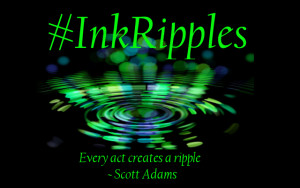 When it comes to publishing a book, there are so many more options than there used to be. If you’re new to the business, it can be downright overwhelming and confusing to decide what publishing path is the right one for you. That is why we decided to tackle the topic in this month’s #InkRipples.
When it comes to publishing a book, there are so many more options than there used to be. If you’re new to the business, it can be downright overwhelming and confusing to decide what publishing path is the right one for you. That is why we decided to tackle the topic in this month’s #InkRipples.
Traditional Publishing – For my intents and purposes, when I’m referring to traditional publishing, I mean a publishing house that offers advances to their authors and their books come out in print simultaneously with their ebooks (for the most part, though you may find imprints within the publishing house that deviates from this). Some publishers that don’t meet these criteria might call themselves “traditional publishers,” but I’m going to put those in another category.
- Big 5 – Formerly the Big 6 publishing houses, when Penguin and Random House merged back in 2013, the largest 6 publishing houses became 5. So the big 5 are now Hachette Book Group, HarperCollins, Macmillan, Simon & Schuster, and Penguin Random House. These are the largest 5 publishing houses, the heavy hitters, what many authors consider the gold-standard of publishing. They each have many branches, called imprints, that specialize in certain areas of publishing. They have the ability to offer big advances for books they think will make them lots of money; they have big budgets to market and publicize those books; and they have large, influential distribution channels.
- Medium to Small Traditional Publishers – These publishing houses are smaller than the Big 5, but they are well-known and well-respected in the industry and they have the ability to offer advances and print and ebooks release simultaneously. Sourcebooks and Charlesbridge are good examples of these smaller traditional publishers.
~Pros and Cons of Traditional Publishers – The big advantage to going with a traditional publisher is the influence they have. Your books will likely be in all the major bookstores and easily available. You’ll also have a full editorial staff to support you in making the book the best it can be and hopefully at least a small marketing push made by the publisher. There is a certain legitimacy that many still feel about traditional publishing that you won’t find with the other paths of publishing (not that this is my personal feeling, but I will admit that a stigma exists for those who chose a different publishing path). You as an author also have no monetary investment in the process of making the book when you traditionally publish.
A disadvantage is that you might end up being a small fish in a big pond. If your book isn’t of their heavy-hitters for that publishing season, it might get little attention or push from the publisher. The fact is, no matter what publishing path you chose, unless you’re a big-name author, you probably will have to do much of the marketing yourself. And if your book doesn’t sell well (the definition of a well-selling book will vary greatly depending on your situation), it might have a short self-life. It’s also really hard to break into traditional publishing, and you usually need an agent to submit to these publishers.
Hybrid Publishers – This is an emerging term in the publishing industry and may mean different things to different people. Basically what I mean by a hybrid publishers is a publisher that exists in the space between traditional and self-publishing. They may be a digital only publisher or a digital first one (where select titles come out in print only after the ebook is released), as is the case with the publisher of my YA fantasy ELIXIR BOUND, MuseItUp Publishing. They usually offer royalty-only payments with no advances. Some of the Big 5 houses have imprints that operate this way.
~Pros and Cons of Hybrid Publishers – Hybrid publishers often have long backlists that don’t get pulled because of slow sales because there is less investment up front. Generally, like traditional publishing, you as an author don’t have to put your own money into anything (until it comes to any marketing you opt to invent in), as the editing, cover art, and production of the book is handled by the publisher.
Without an advance, though, the author has to rely on royalties for payment, which can be slow in coming. Sales may also be low because hybrid publishers don’t have the clout and distribution channels of of traditional publishers. If you do have a print book, it may or may not end up on the bookshelves at bookstores.
Self-publishers – When you decide to do it all yourself and skip working with a publishing house all together, that is self-publishing. You, the author, are your own publisher. You may decide to create your own publishing company so you have a publisher’s name associated with your book and for tax purposes (as I did with PIRATE ISLAND), but it’s still self-published.
~Pros and Cons of Self-Publishing – The main pro and con of self-publishing is pretty much the same thing: you have all the control! That’s a good thing in some ways because you make all the decisions for your book and you reap all the benefits (except for what your distributing partners take). But that also means you have to make a ton of decisions and you have to be informed about all the aspects of creating a book. It’s a big learning curve, but it’s also wonderfully freeing to self-publish. You also have to put up your own money for any services (editing, cover, formatting, etc…) that you don’t decide to do on your own. And you should definitely hire out for those areas you need help. Even a great self-editor should no solely rely on their own editing skills for editing a book your going to self-publish.
*Note on Vanity Publishers – Vanity presses are where authors pay to have their books published. These are not really publishing houses in a sense that they don’t have an acquisitions process. If they do offer any kind of editing or cover services, it’s usually for an additional fee. Honestly, most vanity presses are scams, overcharging authors and giving them very little in return. These should not be confused with reputable, professional editing or formatting services that charge a fee for help with editing or formatting for authors who are interested in self-publishing or going through a round of professional editing before submitting to agents or publishing houses.
What types of publishing have you tried? How has it worked out for you?
#InkRipples is a monthly meme created by Katie L. Carroll, Mary Waibel, and Kai Strand. We pick a topic (August is all about options in publishing), drop a ripple in the inkwell (i.e. write about it on our blogs), and see where the conversation goes. We’d love to have you join in the conversation on your own blogs or on your social media page. Full details and each month’s topic can be found on my #InkRipples page.





















I knew you would have a comprehensive look at the options. Dang, you’re so good! That’s why I decided to look at it from a different angle 🙂 I hadn’t heard the term Hybrid Publishers before, just hybrid author, which I consider myself, since I publish through small press as well as self-publish. Interesting.
I love that you took a different angle on your post…the beauty of #inkripples is seeing all the different ways a topic can be approached. I don’t think hybrid publishers is an industry standard term, but I’ve seen it being tossed around and it totally fit my purposes, so I went with it.
Great info, Katie. I had not heard of Hybrid Publishing either. Interesting. My guess is there are many more of those now. I’m glad you added the Vanity Presses and what they mean. You did a nice job of distinguishing the kinds of options available now and the pros and cons for going with each.
I selected “hybrid” for my books because I wanted more help than self-publishing could give me. I liked the idea of someone else dealing with the outlets. And it’s good to have “partners.” But I hate the wait. We must get in line behind other authors and sometimes that wait is very frustrating. This is the case as well with the “traditional” houses you mentioned.
Thanks, Joan! I didn’t go much into the long wait time with traditional publishers (and to a lesser extent hybrid ones), but that is definitely one of the more frustrating aspects of it.
Great explanation of the different kind of publishers. I guess mine (I have 4) are all hybrid. New word for me. You say MIU is one. They have two of my books. Glad to know this. I’m satisfied with my publishers. Traditional publishers, from what I’ve seen, take a long time to publish your book. Waiting is hard. Thanks.
Thanks! I think some of the hybrid publishers call themselves traditional publishers (I’m pretty sure MIU considers themselves a traditional publisher), but I felt like there should be a distinction between what I refer to as traditional and hybrid in my post. The terminology isn’t set in stone, I suppose.
Waiting is hard! One of the most frustrating aspects of publishing in general!